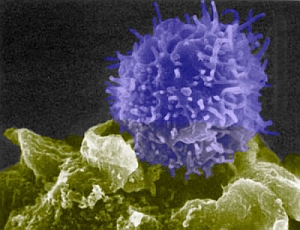The global pharmaceutical company Novartis and University of Pennsylvania in Philadelphia will collaborate on a new type of immunotherapy to treat leukemia and other cancers. Novartis and Penn will also form the Center for Advanced Cellular Therapies on the Penn campus to conduct research on related immunotherapies.
The partnership will conduct research, develop and take to market chimeric antigen receptor immunotherapies for the treatment of cancers. With chimeric antigen receptor immunotherapies, T-cells that protect the body from infections are drawn from a patient’s blood, then re-coded to identify and seek out cells that express proteins present on a patient’s cancerous tumor. When the T cells are re-introduced into the patient’s blood, they bind to the targeted cancer cells and destroy them.
Penn has already developed an experimental therapy based on chimeric antigen receptors called CART-19 that targets a protein called CD19, associated with malignancies such as chronic lymphocytic leukemia, B-cell acute lymphocytic leukemia, and diffuse large B-cell lymphoma. Early results from a clinical trial of CART-19, conducted by Penn, show potent effects in three patients with advanced chronic lymphocytic leukemia who had previously undergone multiple courses of chemotherapy and biological therapy.
Two of the patients were still in complete remission more than a year into the CART-19 trial, and the third patient maintained partial remission for more than seven months. Adverse effects included an immune deficiency known as hypogammaglobulinemia and symptoms of tumor lysis syndrome, an effect of tumor breakdown, for which patients received treatment.
Under the agreement, Penn grants Novartis an exclusive license to chimeric antigen receptors developed through the partnership for all treatments, including CART-19. Novartis and Penn plan to start a phase 2 clinical trial with CART-19 during the fourth quarter of 2012. Although financial amounts were not disclosed, Novartis will provide an up-front payment, research funding, and milestone payments for the achievement of clinical, regulatory, and commercial milestones, as well as royalty payments.
As part of the agreement, Novartis will fund the building of a Center for Advanced Cellular Therapies on the Penn campus for the discovery and development of additional therapies based on chimeric antigen receptors. Novartis and Penn say it is the first research center devoted to development and manufacturing of adoptive T-cell immunotherapies.
Last month the Daily Pennsylvanian, Penn’s campus newspaper, reported that St. Jude Children’s Research Hospital in Memphis filed suit against Penn, claiming that Penn’s researchers violated an agreement drawn between the two institutions over research involving chimeric antigen receptors. Novartis says the outcome of the suit could affect the financial aspects of the partnership with Penn.
Read more:
- Strategy Proposed for Overcoming Resistance to Cancer Drug
- Companies, University Team-Up on Drug Side Effects Model
- Novartis, Foundation Medicine to Partner on Genome Analysis
- Novartis, Broad Institute Partner on Cancer Genome Database
- Merck to Fund New Translational Research Institute
* * *


 RSS - Posts
RSS - Posts
I am Dr. Nilima S. Desai working since 1992 in Immunohistochemistry Division as Junor Scientific Officer in Gujarat Cancer & Research Institute Would like to know more about Immunotherapies in research.
Thank you Dr. Desai for your question and visit to Science Business. Dr. Carl June at University of Pennsylvania is the principal investigator on the project, and he can probably answer your questions. You can reach Dr. June by e-mail: CJUNE [at] EXCHANGE.UPENN.EDU or by telephone at +1 (215) 746-5133 – AK
[…] Novartis, Penn to Partner on Cancer Immunotherapies […]
[…] Novartis, Penn to Partner on Cancer Immunotherapies […]
Hi Alan,
Is there any trails started on CML too….? My brother is diagnosed with CML this year. When this will be available to public.
Thank you Lucky. Let me suggest you check with ClinicalTrials.gov or the Leukemia and Lymphoma Society (http://www.lls.org/) for clinical trials on CML. I wish your brother and yourself the best. – AK